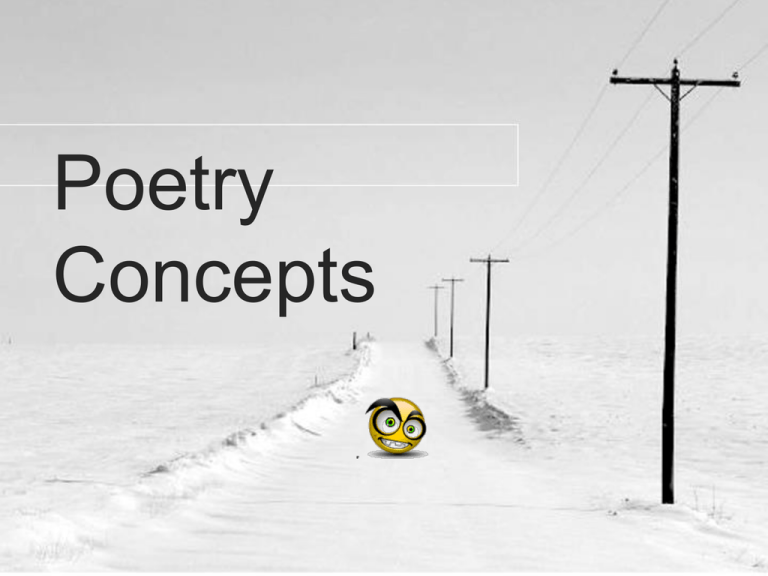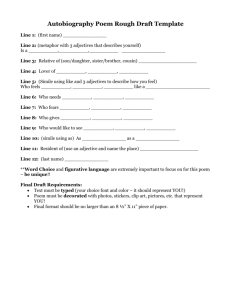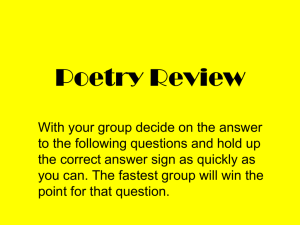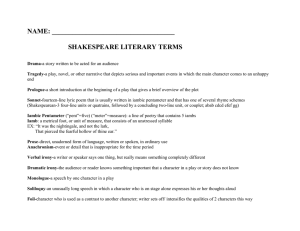01- Poetry Concepts
advertisement

Poetry Concepts Key Words We Will Be Looking At • • • • • • • • • • Alliteration Allusion Cliché Connotation Couplet Imagery Irony Metaphor Mood Oxymoron • • • • • • • • • • Onomatopoeia Persona Personification Pun Refrain Rhyme Scheme Rhythm Simile Stanza Symbol Alliteration • Alliteration is the repetition of consonant sounds usually at the beginning of the word two or more times in a line of poetry. • Tongue twisters are extreme examples of alliteration • She sells seashells by the seashore • Tommy turned timidly toward Timmy • It can just be two words • Jacob just asked a good question. • Jacob asked a good question just now. Allusion • Allusions are references to words, phrases, people, etc. from literature ,history, art, or politics. • An allusion connects a piece of writing to real life or to an aspect of culture. • Example- In The Gift of the Magi the story and the title itself allude to the story of the wise men from the Bible. Cliché • A cliché is an overused expression or phrase • You mean the world to me • You’re making me crazy • I love you more than anything • Comparing love or beauty to inanimate object • Flowers and candy Connotation • The emotion that you associate with a word the non-dictionary definition • A writer may choose to use a particular word in order to get a certain response from a reader. • These are words that when you hear them make you have an emotional response Couplet • A pair of lines that rhyme • The girl had purple hair/She acted like she didn’t care • The internet is really really great/I’ve got a fast connection so I don’t have to wait • Chillin’ out, take it slow/Then you rock out the show Euphemism • A polite or less blunt way of saying something that might be offensive or bad. • He’s a few sandwiches short of a picnic. • He passed away last night. Imagery • Imagery is something you read that relates to and calls upon our five senses. • The way things sound look smell taste feel. • It helps us to fully experience a piece of writing and brings us closer to understanding its plot (if there is one) and the mood. Irony • Verbal- when you say one thing but mean something else (sarcasm) • Situational- when the reader expects one thing to happen and then something different happens • Dramatic- when the reader knows something the characters do not Metaphor • Speaking about one thing as though it were another unrelated thing • States the comparison as if it were a fact. • What light through yonder window breaks It is the east and Juliet is the sun. Mood • The general feeling or atmosphere that a poem creates • Are you supposed to feel happy, depressed, scared, excited, suspicious, or confused • What does the author want you to feel Oxymoron • Two words that don’t seem to go together but do to create a new meaning. • Jumbo shrimp • A fine mess • Act naturally • Deafening silence • Girly man Onomatopoeia • A word that sounds like what it means • Splat • Bang • Knock • Burp • Crash • Boom Persona • The person who is speaking in a poem • Sometimes its a person an animal a rock or anything else • Who’s telling us the information is often times as important as the words Personification • Giving something non-human, human qualities • The wind whistled through the trees • The stars blinked rapidly • The sunset reached down and enfolded the horizon • Her heart broke into a thousand pieces Pun • Using words that have multiple meanings • That’s a nice gun you’ve got there • There was once a cross-eyed teacher who couldn't control his pupils. • To write with a broken pencil is pointless. Refrain • One or more lines that are repeated in a poem or song is also often referred to as the chorus • Usually the part that gets stuck in your head • Quoth The Raven Nevermore. • Maybe next time hell think before he cheats. Rhyme Scheme • A pattern of rhyming sounds at the ends of lines in a poem. Every who down in Who-ville like Christmas a lot ---------------A But the Grinch who lived just north of Who-ville did not.-------A The Grinch hated Christmas the whole Christmas season.---B Now please dont ask why no one quite knows the reason.---B It could be his head wasnt screwed on just right.----------------C It could be perhaps that his shoes were too tight.---------------C But I think that the most likely reason of all-----------------------D May have been that his heart was two sizes to small.---------D Rhythm • Pattern of sound created by the arrangement of stressed and unstressed syllables in a line of poetry • Basically it’s how the poem sounds • Just like songs are supposed to be played a certain way poems are supposed to be read a certain way Simile • A simile is a figure of speech that directly compares two different things, usually by using the words “like” or “as”. • It is different from a metaphor, which compares two unlike things by saying that the one thing is the other thing. • Flopping like a fish • Dumb as a post Symbol • An object that represents something else • Usually something simple or ordinary that represents a bigger concept • A heart = love • A ring = marriage Theme • • • • • • • The main idea of the poem Love- Love conquers all Death- You cant escape death Carpe Diem- Seize the day because life is short War- War tears families apart Youth- Youth is impulsive Choices- Make good choices because you have to live with them • Themes are the authors opinions on those subjects. Shakespearean Syntax • • • • • • I ate the sandwich. I the sandwich ate. Ate the sandwich I. Ate I the sandwich. The sandwich I ate. The sandwich ate I.






